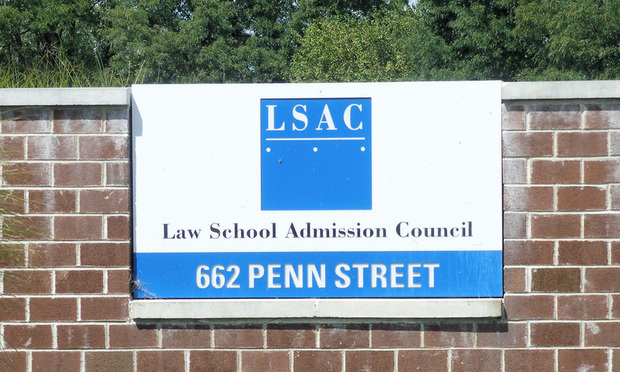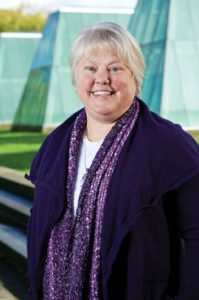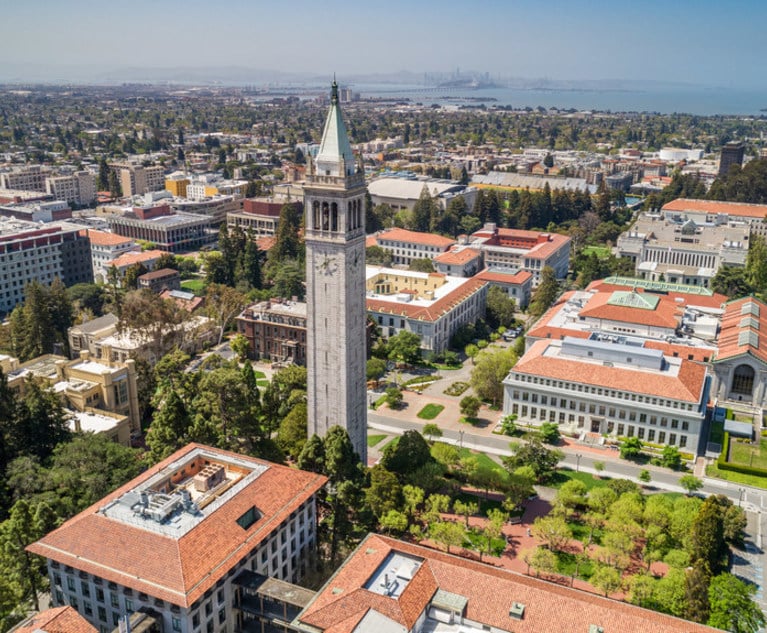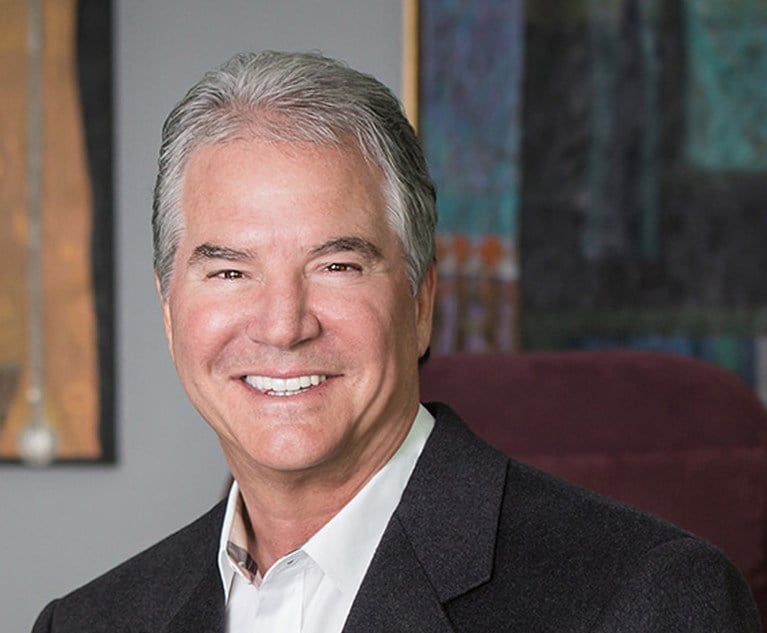LSAT Maker Hit With $480K in Fees for Disability Violations
In addition to being held in civil contempt for violating rules on how it accommodates disabled LSAT takers, the Law School Admission Council must now pay $480,000 in attorney fees to the California agency that took it to court.
November 06, 2018 at 01:29 PM
6 minute read
 Law School Admisson Council in Newtown, Pennsylvania.
Law School Admisson Council in Newtown, Pennsylvania.
A federal judge has ordered the Law School Admission Council to pay nearly half a million dollars in attorney fees to the California Department of Fair Employment and Housing in connection to litigation over its accommodation of Law School Admission Test takers with disabilities.
The California agency sought more than $567,000 in attorney fees after it successfully petitioned the court to hold the council in civil contempt for violating a 2014 agreement on how it would handle requests for accommodation on the LSAT. The parties met for a court hearing on Friday. U.S. Magistrate Judge Joseph Spero of the U.S. District Court for the Northern District of California on Monday largely sided with the agency in finding that the council must pay $480,000.
“As a public prosecutor, DFEH is entitled to recover attorney's fees for successful civil rights litigation,” said Kevin Kish, director of the California agency. “Because fees can only be used to offset costs of the department, seeking fees in appropriate cases directly supports DFEH's mission of protecting all Californians from unlawful discrimination.”
Council President Kellye Testy said Tuesday that Friday's hearing largely focused on past disagreements, and that the LSAT maker is committed to working with regulators and upholding the consent decree.
 Kellye Testy.
Kellye Testy.“While we had hoped for a different outcome on some issues, we see last week's hearing as a very constructive step forward,” she said. “We would much rather work together with [the California agency] and other groups to provide access and accommodation, instead of spending resources in litigation. We have taken significant steps to expand access, and we intend to follow the judge's instruction to all parties to work even more closely together to fulfill our common goal of ensuring access for all test-takers.”
The California agency's legal team was headed by associate chief counsel Mari Mayeda, while the council was represented by lawyers from Perkins Coie and Norton Rose Fulbright.
The council and the California agency have been locked in a legal battle since 2012, when the agency and the U.S. Department of Justice sued the LSAT maker for violating the rights of those seeking disability accommodations on the exam. The plaintiffs argued that the council made accommodation seekers jump through too many hoops and denied too many requests, in violation of the Americans with Disabilities Act. (The council maintained that it needed to be vigilant to protect the integrity of its exam and be fair to all takers.)
The initial portion of the litigation wrapped up in 2014 with a consent decree under which the council stopped alerting law schools of LSAT scores earned under extra time and paid $8.7 million to people who had applied for accommodations between 2009 and 2014. Later, the parties jointly developed an extensive set of rules about how the council would evaluate accommodation requests. But the California agency in 2017 asked the court to find the council in contempt for violating the agreed-on procedures. Most notably, it said the council was essentially pressuring test takers to accept lesser accommodations than those they requested.
Spero agreed and in March held the council in civil contempt. The next round of litigation centered on the attorney fees the California agency incurred while investigating the council's compliance with the accommodation procedures and bringing its contempt motion. It filed its initial fee request in July, which the council called “unreasonable.”
The council's August motion in opposition to the California agency's fee request does not stipulate the amount it believed was appropriate, but it asked the court to reduce the hourly billing rate agency lawyers requested and restrict the billable hours eligible for recovery to only those that involved the preparation of the contempt motion, not the hours spent investigating whether the council had abided by the accommodation rules.
More specifically, the council asked the court to use an hourly rate of $170 instead of rates of $850, $425 and $290 for the agency's trio of lawyers, based on their seniority and level of experience. The council cited statements by the agency's former director in 2012 and 2013 that it would seek to recover fees at that hourly billing rate rather than at market rates. Spero was not swayed, however, noting in his opinion that those statements were not made in connection with the LSAT litigation.
However, Spero sided with the council in finding that the California agency is not entitled to recover fees and costs it incurred while investigating test takers files at the council's Pennsylvania headquarters in order to determining whether it was complying with the rules. Agency lawyers would have had to preform that investigation regardless of whether the council was violating the consent decree, he reasoned.
Still, the council's decision to pursue several “dubious arguments” that it, in fact, was following the accommodation rules served to run up the California agency's costs, Spero found, thus increasing the fee amount it will now have to pay.
“[The council] was, of course, entitled to defend itself against [the California agency's] motion, but in light of the fee-shifting provision in the consent decree, the consequence of such tactics is that [the council] faces significantly greater liability for [the California agency's] fees than it might have incurred if [the council] had chosen to concede issues on which it had little chance of prevailing,” Spero wrote.
Testy said that she hopes the litigation over disability accommodations is over.
“As our recent actions have demonstrated, we are committed to working with the government and advocacy groups to ensure that the LSAT is accessible to all candidates, and we are 100 percent dedicated to fulfilling all of our obligations under the consent decree,” she said.
This content has been archived. It is available through our partners, LexisNexis® and Bloomberg Law.
To view this content, please continue to their sites.
Not a Lexis Subscriber?
Subscribe Now
Not a Bloomberg Law Subscriber?
Subscribe Now
NOT FOR REPRINT
© 2025 ALM Global, LLC, All Rights Reserved. Request academic re-use from www.copyright.com. All other uses, submit a request to [email protected]. For more information visit Asset & Logo Licensing.
You Might Like
View All
Lawsuit Accuses University of California of Racial Discrimination in Admissions
4 minute read
Assessing the Second Trump Presidency’s Impact on College Sports


LSAT Administrator Sues to Block AI Tutor From Using ‘Famous, Distinctive’ Test Prep Materials
3 minute readTrending Stories
Who Got The Work
J. Brugh Lower of Gibbons has entered an appearance for industrial equipment supplier Devco Corporation in a pending trademark infringement lawsuit. The suit, accusing the defendant of selling knock-off Graco products, was filed Dec. 18 in New Jersey District Court by Rivkin Radler on behalf of Graco Inc. and Graco Minnesota. The case, assigned to U.S. District Judge Zahid N. Quraishi, is 3:24-cv-11294, Graco Inc. et al v. Devco Corporation.
Who Got The Work
Rebecca Maller-Stein and Kent A. Yalowitz of Arnold & Porter Kaye Scholer have entered their appearances for Hanaco Venture Capital and its executives, Lior Prosor and David Frankel, in a pending securities lawsuit. The action, filed on Dec. 24 in New York Southern District Court by Zell, Aron & Co. on behalf of Goldeneye Advisors, accuses the defendants of negligently and fraudulently managing the plaintiff's $1 million investment. The case, assigned to U.S. District Judge Vernon S. Broderick, is 1:24-cv-09918, Goldeneye Advisors, LLC v. Hanaco Venture Capital, Ltd. et al.
Who Got The Work
Attorneys from A&O Shearman has stepped in as defense counsel for Toronto-Dominion Bank and other defendants in a pending securities class action. The suit, filed Dec. 11 in New York Southern District Court by Bleichmar Fonti & Auld, accuses the defendants of concealing the bank's 'pervasive' deficiencies in regards to its compliance with the Bank Secrecy Act and the quality of its anti-money laundering controls. The case, assigned to U.S. District Judge Arun Subramanian, is 1:24-cv-09445, Gonzalez v. The Toronto-Dominion Bank et al.
Who Got The Work
Crown Castle International, a Pennsylvania company providing shared communications infrastructure, has turned to Luke D. Wolf of Gordon Rees Scully Mansukhani to fend off a pending breach-of-contract lawsuit. The court action, filed Nov. 25 in Michigan Eastern District Court by Hooper Hathaway PC on behalf of The Town Residences LLC, accuses Crown Castle of failing to transfer approximately $30,000 in utility payments from T-Mobile in breach of a roof-top lease and assignment agreement. The case, assigned to U.S. District Judge Susan K. Declercq, is 2:24-cv-13131, The Town Residences LLC v. T-Mobile US, Inc. et al.
Who Got The Work
Wilfred P. Coronato and Daniel M. Schwartz of McCarter & English have stepped in as defense counsel to Electrolux Home Products Inc. in a pending product liability lawsuit. The court action, filed Nov. 26 in New York Eastern District Court by Poulos Lopiccolo PC and Nagel Rice LLP on behalf of David Stern, alleges that the defendant's refrigerators’ drawers and shelving repeatedly break and fall apart within months after purchase. The case, assigned to U.S. District Judge Joan M. Azrack, is 2:24-cv-08204, Stern v. Electrolux Home Products, Inc.
Featured Firms
Law Offices of Gary Martin Hays & Associates, P.C.
(470) 294-1674
Law Offices of Mark E. Salomone
(857) 444-6468
Smith & Hassler
(713) 739-1250






